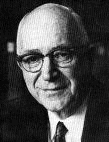A Quote by Daniel Dennett
I am a philosopher, not a scientist, and we philosophers are better at questions than answers.
Related Quotes
There are, of course, a number of epistemological questions, some of which lie more in the province of the philosopher than they do the economist or the social scientist. The one with which I am particularly concerned here is that of the role of knowledge in social systems, both as a product of the past and as a determinant of the future.
I think one reason is that philosophers are more insecure to speak accessibly because non-philosophers are skeptical that philosophers have any special expertise. After all, all people - not just philosophers - have attitudes and points of view on various philosophical questions, and they rather resent being told that there are professionals who can think about these things better.
Socrates himself said, 'One thing only I know, and this is that I know nothing.' Remember this statement, because it is an admission that is rare, even among philosophers. Moreover, it can be so dangerous to say in public that it can cost you your life. The most subversive people are those who ask questions. Giving answers is not nearly as threatening. Any one question can be more explosive than a thousand answers.
I just would like to say that over more than a quarter-century as a scientist and a believer, I find absolutely nothing in conflict between agreeing with Richard [Dawkins] in practically all of his conclusions about the natural world, and also saying that I am still able to accept and embrace the possibility that there are answers that science isn't able to provide about the natural world - the questions about why instead of the questions about how. I'm interested in the whys.
The great philosophers of the 17th and 18th centuries did not think that epistemological questions floated free of questions about how the mind works. Those philosophers took a stand on all sorts of questions which nowadays we would classify as questions of psychology, and their views about psychological questions shaped their views about epistemology, as well they should have.








































